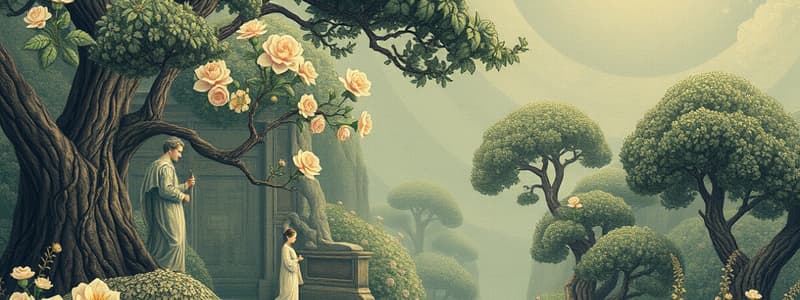Podcast
Questions and Answers
What is a renga comprised of?
What is a renga comprised of?
- A chain of interlocking tanka by different poets (correct)
- A single poem written by one poet
- A lyrical song performed in ancient festivals
- A narrative poem about historical events
What genre did the hokku eventually develop into?
What genre did the hokku eventually develop into?
- Tanka
- Sonnet
- Haiku (correct)
- Ballad
Who is considered the founding father of Go-Joseon according to Korean mythology?
Who is considered the founding father of Go-Joseon according to Korean mythology?
- Gwanggaeto
- Jumong
- Silla's founding king
- King Dan-gun (correct)
Which kingdom was established first among the Three Kingdoms of Korea?
Which kingdom was established first among the Three Kingdoms of Korea?
Which of the following statements about Goguryeo is true?
Which of the following statements about Goguryeo is true?
Which kingdom allied with the Dang Dynasty of China to defeat the Baekje and Goguryeo kingdoms?
Which kingdom allied with the Dang Dynasty of China to defeat the Baekje and Goguryeo kingdoms?
What type of reforms were made during the Unified Silla period?
What type of reforms were made during the Unified Silla period?
What significant cultural influence did Unified Silla integrate into its society?
What significant cultural influence did Unified Silla integrate into its society?
What remains today as a significant historical site from the Silla kingdom?
What remains today as a significant historical site from the Silla kingdom?
What was established by the displaced people of Goguryeo after Silla unified the Three Kingdoms?
What was established by the displaced people of Goguryeo after Silla unified the Three Kingdoms?
Flashcards are hidden until you start studying
Study Notes
Ancient Japanese Literature
- Renga: A collaborative poetic form consisting of interlocking tanka verses, with contributions from multiple poets. Tanka is divided into 17 and 14 syllables.
- Hokku: The opening verse of a renga, which evolved into the standalone form known as Haiku, consisting of three lines with a 5-7-5 syllabic structure. Haiku emphasizes precision and often includes seasonal references (kigo).
Historical Background of Korea
- Go-Joseon (2333 BC - 108 BC): Founded by King Dan-gun, it is considered Korea's first state and celebrated on Gaecheonjeol, the national foundation day. The kingdom eventually split into three kingdoms: Goguryeo, Baekje, and Silla.
- Three Kingdoms (50 BCE - 668 CE):
- Goguryeo (37 BCE - 668 CE): Became a powerful nation across Manchuria and northern Korea, founded by King Jumong, known as the Holy King of the East.
- Baekje (18 BCE - 663 CE): Located in southwestern Korea, Baekje played a vital role in importing Chinese culture and Buddhism to Japan while constantly contending with Silla and Goguryeo.
- Silla (57 BCE - 68 CE): Initially developed slower but unified the Three Kingdoms with the help of the Tang Dynasty of China in the 7th century, resulting in Unified Silla.
Unified Silla
- Unified Silla (668-935): Introduced administrative, tax, and military reforms; strengthened trade relations with China and Japan, enhancing cultural integration. Notable for its advanced architecture, exemplified by the temple Bulguksa, and the historical capital Gyeongju.
Balhae
- Founded by displaced Goguryeo inhabitants post-unification of Silla, Balhae became a successor state to Goguryeo, maintaining cultural and political continuity along with stability.
Korean Folklore and Music
- Arirang: Celebrated as Korea's most famous folk song, with themes including love and peasant life, often incorporating various forms of traditional songs.
Hangul
- Developed as a written form accessible to all Koreans, promoting literacy among commoners and women, contrasting with the elite's use of Chinese. The first work in Hangul was "Yongbi Ochon-ka."
Neo-Confucianism
- Dominated Korean education and culture, ensuring the continued study of Chinese. Hangul's creation did not reduce the elite's monopoly on knowledge.
Shijo and Kasa
- Shijo: A traditional lyric form originating in Goryeo, containing three lines and 14-16 syllables each, with prominent poets including Chong Chol and Kim Su-jang.
- Kasa: Emerged in the mid-1400s, characterized by couplets dividing into parts with distinct syllable counts.
Role of Women
- During the Joseon era, women faced discouragement from learning Chinese, causing reliance on Hangul for literacy.
Birth of Islam
- Muhammad's revelation from Allah started in 610, leading to the establishment of the Islamic community in Madinah (622) after fleeing from Mecca due to assassination threats.
Core Principles of Islam
- Islam: Translates to "submission" and "peace," emphasizing the idea of surrendering to Allah's will.
- Muslim: A term for someone who accepts God's guidance; historically misinterpreted as "Mohammedans."
Mecca
- Considered the holiest city in Islam, where Muslims face during prayers and are encouraged to undertake the pilgrimage of Hajj at least once.
Five Pillars of Islam
- Shahada: The declaration of faith, affirming belief in one God and Muhammad as His prophet.
- Salat: Mandatory prayers performed five times daily, with mosques (Masjid) serving as places of worship.
- Sawm: Fasting during Ramadhan from dawn to dusk, with exceptions for those who may be burdened by it.
- Zakat: Obligatory alms-giving for those who can afford it, meant to aid the poor and promote Islam.
Studying That Suits You
Use AI to generate personalized quizzes and flashcards to suit your learning preferences.




